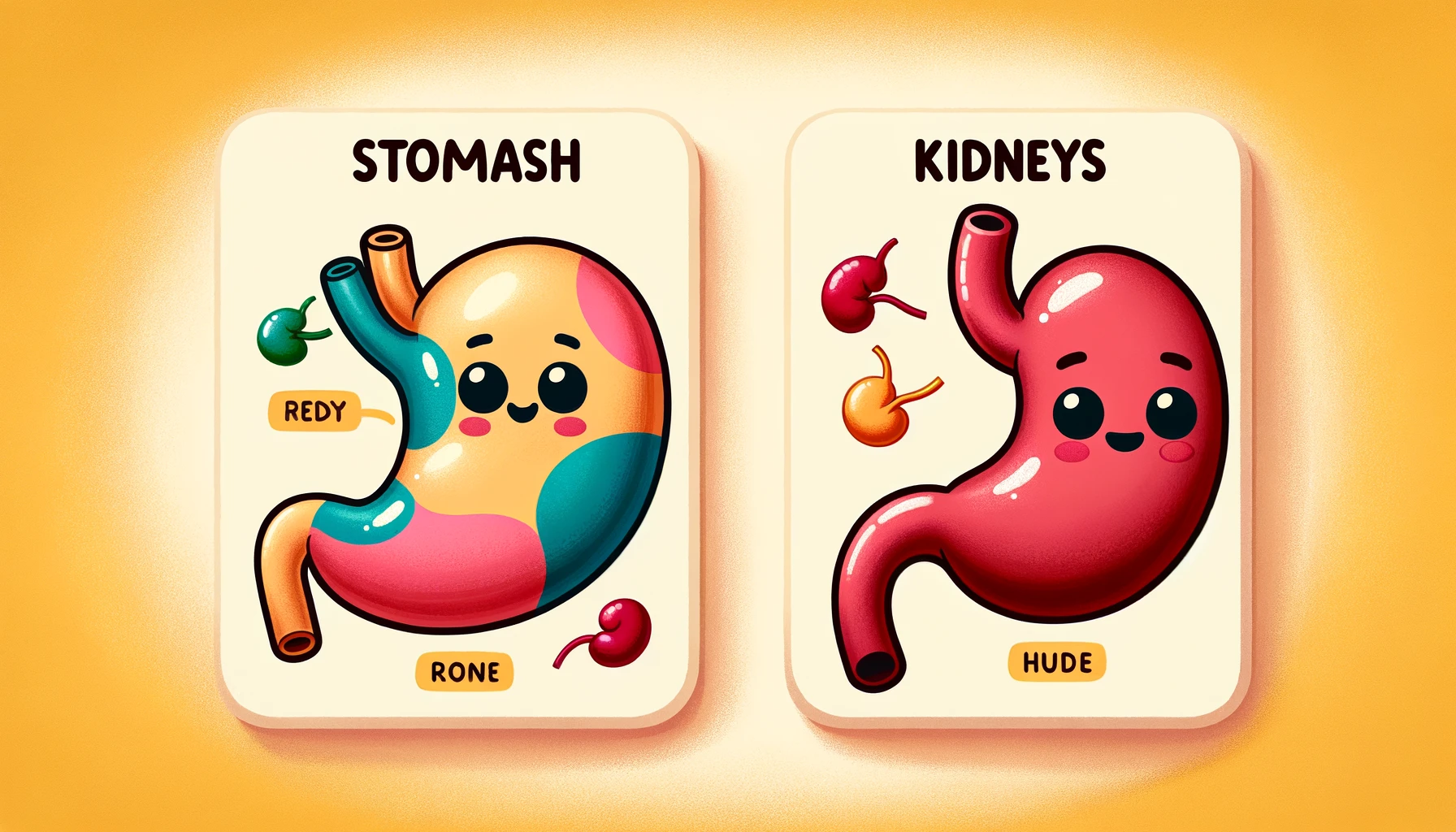Stomach vs. Kidney: Understanding Their Differences and Functions
Table of Contents
- Introduction to the Stomach and Kidneys
- Structure of the Stomach
- Structure of the Kidneys
- Functions of the Stomach
- Functions of the Kidneys
- Stomach vs. Kidney: Key Differences
- Common Stomach Disorders
- Common Kidney Disorders
- Importance of Stomach and Kidney Health
- Conclusion
- References
Stomach vs. Kidney: Understanding Their Differences and Functions
Introduction to the Stomach and Kidneys The stomach and kidneys are vital organs that play crucial roles in maintaining overall health. While the stomach is primarily involved in digestion, the kidneys are essential for waste elimination and regulating various body functions. This article explores the differences and functions of the stomach and kidneys, highlighting their importance in the body’s daily operations.
Structure of the Stomach The stomach is a muscular, hollow organ located in the upper abdomen, between the esophagus and the small intestine. Key structural features include:
- Fundus: The upper part that stores undigested food and gases released during digestion.
- Body: The main, central region where most digestive activities occur.
- Antrum: The lower part that grinds food and mixes it with digestive juices.
- Pylorus: The passage leading to the small intestine, regulated by the pyloric sphincter.
Structure of the Kidneys The kidneys are two bean-shaped organs located on either side of the spine, just below the rib cage. Key structural features include:
- Cortex: The outer layer containing nephrons, the functional units of the kidney.
- Medulla: The inner layer containing renal pyramids and collecting ducts.
- Renal Pelvis: The central cavity that collects urine before it flows into the ureter.
- Nephrons: Each kidney contains about one million nephrons, which filter blood and produce urine.
Functions of the Stomach The stomach performs several essential functions in the digestive process:
- Mechanical Digestion: The stomach’s muscular walls contract to mix and break down food.
- Chemical Digestion: Gastric juices containing hydrochloric acid and digestive enzymes break down proteins and other nutrients.
- Storage: The stomach temporarily stores food and releases it gradually into the small intestine.
- Absorption: While the stomach primarily digests food, it also absorbs certain substances like alcohol and some medications.
Functions of the Kidneys The kidneys play a crucial role in maintaining homeostasis by performing several functions:
- Filtration of Blood: The kidneys filter waste products, excess substances, and toxins from the blood, forming urine.
- Regulation of Fluid Balance: The kidneys regulate the body’s fluid balance by adjusting the volume and concentration of urine.
- Electrolyte Balance: The kidneys maintain the balance of electrolytes, such as sodium, potassium, and calcium.
- Acid-Base Balance: The kidneys help maintain the body’s pH by excreting hydrogen ions and reabsorbing bicarbonate.
- Hormone Production: The kidneys produce hormones like erythropoietin, which stimulates red blood cell production, and renin, which regulates blood pressure.
Stomach vs. Kidney: Key Differences
- Primary Function: The stomach is involved in digestion, while the kidneys are responsible for filtering blood and producing urine.
- Location: The stomach is located in the upper abdomen, whereas the kidneys are located on either side of the spine below the rib cage.
- Structure: The stomach is a single, muscular organ, while the kidneys are paired, bean-shaped organs with a complex structure involving nephrons.
- Processes: The stomach uses mechanical and chemical processes for digestion, while the kidneys use filtration and reabsorption to maintain homeostasis.
Common Stomach Disorders Several disorders can affect the stomach, leading to various symptoms and health issues:
- Gastritis: Inflammation of the stomach lining, often caused by infection, alcohol, or NSAIDs.
- Peptic Ulcers: Open sores that develop on the stomach lining due to infection with H. pylori or long-term use of NSAIDs.
- Gastroesophageal Reflux Disease (GERD): A chronic condition where stomach acid flows back into the esophagus, causing heartburn and irritation.
- Stomach Cancer: Malignant growths in the stomach lining, associated with risk factors like smoking and certain infections.
Common Kidney Disorders Several disorders can affect the kidneys, leading to various symptoms and health issues:
- Chronic Kidney Disease (CKD): A progressive loss of kidney function over time, often caused by diabetes, hypertension, or glomerulonephritis.
- Acute Kidney Injury (AKI): A sudden loss of kidney function, usually due to injury, infection, or severe dehydration.
- Kidney Stones: Hard deposits of minerals and salts that form in the kidneys, causing pain and potential blockage of the urinary tract.
- Polycystic Kidney Disease (PKD): A genetic disorder characterized by the growth of numerous cysts in the kidneys, leading to impaired kidney function.
Importance of Stomach and Kidney Health Maintaining the health of both the stomach and kidneys is essential for overall well-being:
- Healthy Diet: Consuming a balanced diet rich in fruits, vegetables, whole grains, and lean proteins supports both stomach and kidney health.
- Hydration: Drinking plenty of water helps the kidneys filter waste and maintain fluid balance, and aids in digestion.
- Regular Exercise: Physical activity promotes overall health and can help prevent disorders affecting both organs.
- Avoiding Toxins: Limiting the use of substances that can harm the stomach and kidneys, such as alcohol, tobacco, and certain medications.
- Regular Check-ups: Routine medical check-ups can help detect and manage potential issues early.
Conclusion Understanding the differences and functions of the stomach and kidneys is crucial for maintaining overall health. By recognizing the unique roles these organs play in digestion and waste elimination, and by adopting healthy lifestyle habits, individuals can support the optimal functioning of their stomach and kidneys.
<ⓒ WizardMedics (wizardmedics.com)>



